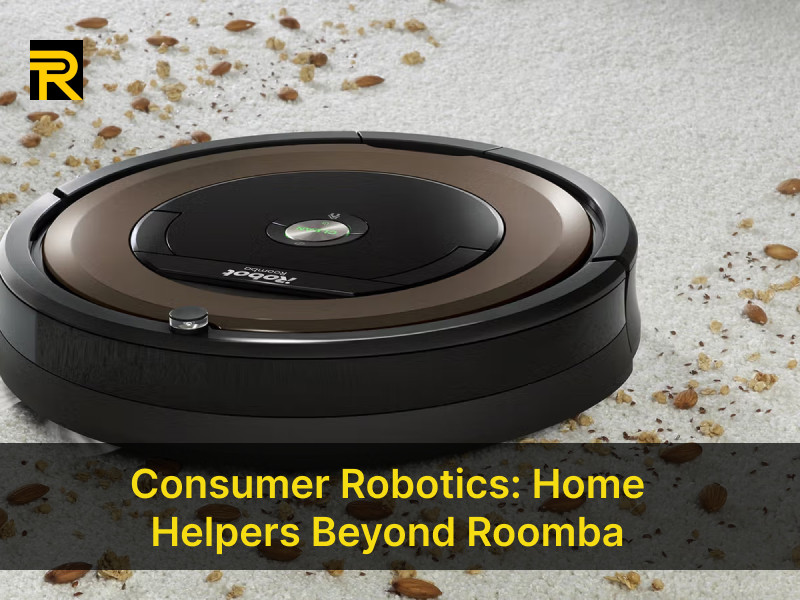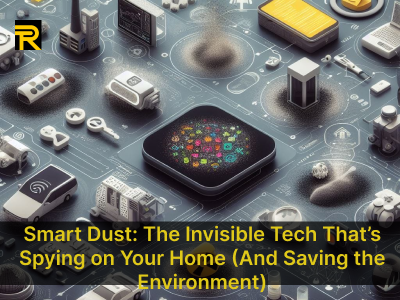
Consumer Robotics: Home Helpers Beyond Roomba
Introduction
The field of consumer robotics has advanced significantly beyond robotic vacuums like Roomba. With affordable personal chef robots 2024, best AI-powered laundry-folding machines, and robotic pet companions for elderly care, smart home automation is evolving rapidly. However, the rise of home robots also brings concerns such as the privacy risks of home assistant robots and the increasing repair costs for household robots. In this article, we explore the latest innovations in consumer robotics and what they mean for the future of home automation.
Affordable Personal Chef Robots 2024
Cooking automation has taken a major leap with affordable personal chef robots 2024. Companies like Moley Robotics and Samsung are introducing AI-powered robotic kitchen assistants that can prepare meals from scratch. These robots are equipped with machine learning algorithms to follow recipes, measure ingredients, and adjust cooking settings. Whether for busy professionals or individuals with limited mobility, personal chef robots are set to redefine kitchen convenience in 2024.
Best AI-Powered Laundry-Folding Machines
Folding laundry is one of the most time-consuming household chores. The best AI-powered laundry-folding machines of 2024 promise to take over this tedious task with precision. Machines like FoldiMate and Laundroid use AI and computer vision to identify clothing types, fold them neatly, and even organize them by category. These laundry robots are becoming increasingly affordable, making them a practical addition to smart homes.
Robotic Pet Companions for Elderly Care
Elderly individuals often experience loneliness, and robotic pet companions for elderly care offer a comforting solution. AI-driven robotic pets like the Joy For All Companion Pet or Sony’s Aibo provide companionship, respond to voice commands, and even simulate emotional interactions. Designed to reduce stress and enhance well-being, these robotic pets are gaining popularity among senior care facilities and independent older adults.
Privacy Risks of Home Assistant Robots
While home robots provide convenience, they also pose significant security concerns. The privacy risks of home assistant robots include data collection, surveillance vulnerabilities, and hacking threats. AI-powered assistants like Amazon Astro and Google’s AI-driven home robots store vast amounts of personal information, raising questions about data privacy. Ensuring robust encryption, user-controlled permissions, and regular security updates is crucial to mitigate these risks.
Tesla Optimus vs Boston Dynamics Atlas Updates
The competition in humanoid robotics is intensifying with Tesla Optimus vs Boston Dynamics Atlas updates. Tesla’s Optimus is designed for household and industrial tasks, aiming to be an affordable robotic assistant, while Boston Dynamics' Atlas, known for its agility and advanced motion capabilities, is being developed for commercial and research applications. In 2024, both companies are expected to release significant updates, pushing the boundaries of humanoid robotics.
How to Program DIY Home Robots with Raspberry Pi
For tech enthusiasts, building a personal home robot is now easier than ever. Learning how to program DIY home robots with Raspberry Pi allows hobbyists and students to create custom automation solutions. Raspberry Pi, combined with AI libraries and open-source robotics kits, enables users to develop robotic vacuum cleaners, smart security bots, and even personal assistants tailored to their needs.
Robotic Gardening Tools for Urban Farming
Urban farming is becoming more accessible with robotic gardening tools for urban farming. AI-powered gardening robots like FarmBot and Tertill automate planting, watering, and weeding tasks, making it easier for city dwellers to maintain a small-scale farm. These innovations contribute to sustainable agriculture by reducing water waste and maximizing crop yields in limited spaces.
Emotional AI in Companion Robots Ethics
As robots become more integrated into our daily lives, the discussion around emotional AI in companion robots ethics is gaining traction. AI-driven companions, such as ElliQ and Lovot, are designed to recognize emotions and interact with users in a meaningful way. However, ethical concerns arise regarding emotional manipulation, user dependency, and the psychological impact of forming attachments to machines.
Repair Costs for Household Robots
While home robotics offer convenience, maintenance costs can be a major concern. The repair costs for household robots depend on factors such as parts availability, AI complexity, and proprietary technology. Companies like iRobot and Dyson are offering extended warranties, but as more sophisticated home robots enter the market, ensuring affordable and accessible repair services will be crucial for widespread adoption.
Best Robotics Kits for STEM Students 2024
Introducing young minds to robotics has never been more exciting with the best robotics kits for STEM students 2024. Kits like LEGO Mindstorms, Arduino Robot Car, and Makeblock mBot provide hands-on learning experiences in coding, engineering, and AI development. These kits are designed to inspire creativity, problem-solving, and innovation among future roboticists.
Conclusion
Consumer robotics in 2024 is expanding far beyond traditional household helpers. From affordable personal chef robots 2024 to robotic gardening tools for urban farming, AI-driven automation is transforming home life. However, considerations such as privacy risks of home assistant robots, repair costs for household robots, and emotional AI in companion robots ethics must be addressed for ethical and sustainable development. As technology progresses, staying informed about advancements like Tesla Optimus vs Boston Dynamics Atlas updates and learning how to program DIY home robots with Raspberry Pi will help consumers make informed decisions about integrating robotics into their lives.
Follow Us
Trending News
Newsletter
Join us to get latest News Updates



